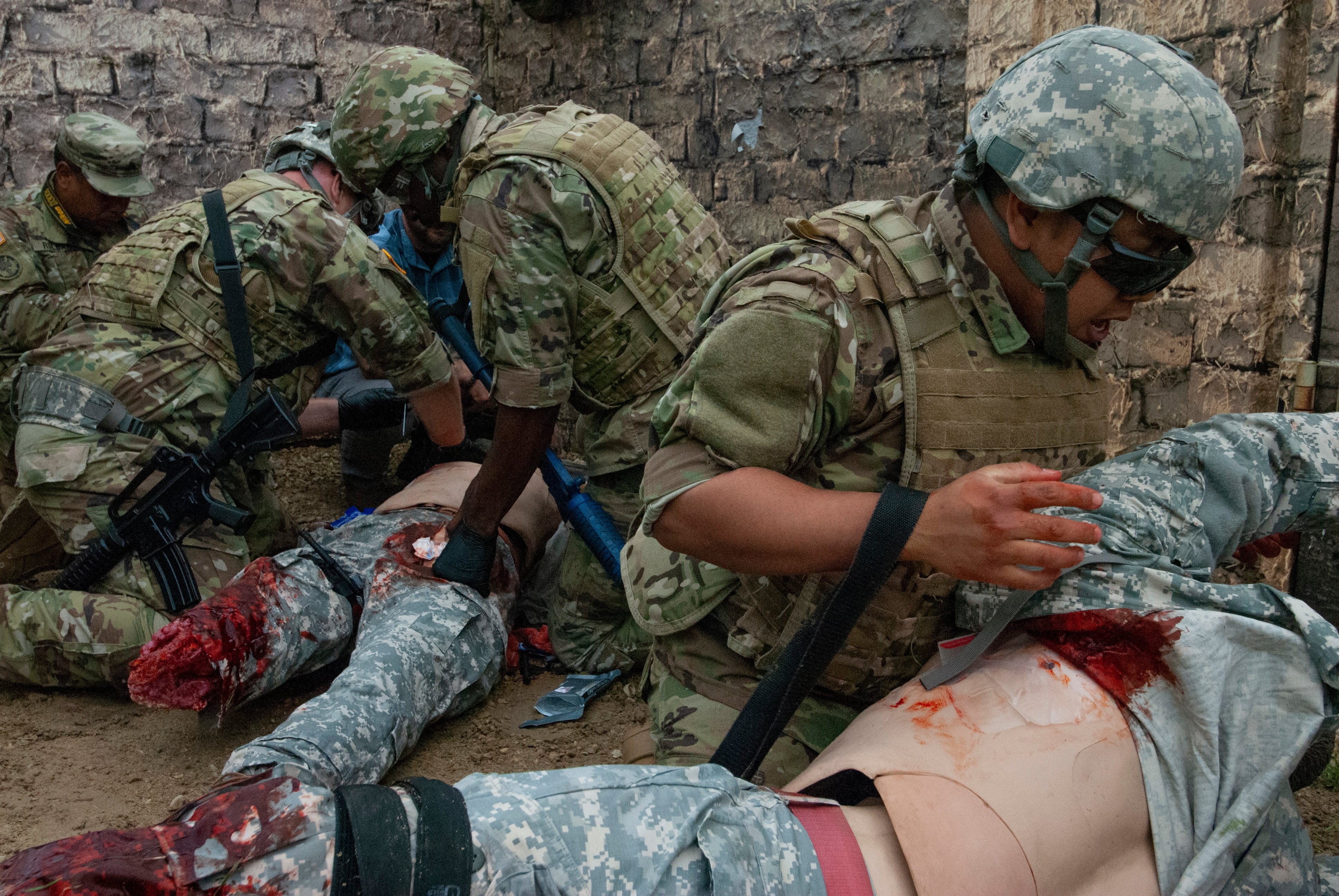As the Marine Corps prepares for a major future fight that may see small units dispersed and operating in hard-to-reach places, it’s also making changes to its military medical requirements regarding who gets medical training and what level of training various battlefield medical providers receive.
The policy updates have to do with tactical combat casualty care, or TCCC, the combat lifesaving program developed by the Defense Health Agency. The first of a trio of changes, published in a July Marine administrative message, requires all Fleet Marine Force and supporting establishment Marines to receive certification in TCCC-All Service Member, the base level of the program, within 12 months of deploying.
TCCC-All Service Member training includes how to stop a hemorrhage and how to recognize a number of other critical medical issues.
This brings the Marine Corps into alignment with a Defense Department directive that all troops get TCCC-All Service Member training. The service replaced its first aid training with this program at boot camps in 2021 and has announced that 85% of the force will be TCCC-ASM certified by 2023.
RELATED

“As the Marine Corps continues to test and validate modern warfighting capabilities and concepts, Marines and Sailors will increasingly be called upon to make bold and consequential decisions in contested environments,” Capt. Phil Parker, a Marine Corps Training and Education Command spokesman, told Marine Corps Times in a statement. “Our Corpsmen must be prepared to operate effectively within this environment and provide our personnel with the level of care necessary to increase survivability over extended periods of time.”
The next update, published in August 2022, directed that TCCC-Combat Lifesaver, the second tier of the joint program, replace the service’s legacy Combat Lifesaver program, and that, as of the first quarter of fiscal 2023, two Marines for every corpsman in a battalion receive the training. This 40-hour course covers the operation of medical equipment and how to provide a spectrum of on-the-scene medical care on the battlefield.
A final change, published in December 2022, deals with TCCC-Medical Personnel, the top level of training in the program. According to the Marine message, this 16-hour advanced course will be provided to all Navy Corpsmen during their primary job “A” school in San Antonio.
The training must be repeated every three years and refresher training must be completed prior to shipboard deployments.
These changes not only meet a mandate they also advance the level of training the personnel who provide battlefield care to Marines receive, and ensure that small units are equipped with the right level of medical expertise for the future fight.
“Collectively, these efforts provide increased training to both medical and non-medical personnel to standardize our TCCC training under DHA requirements,” Lt. Cmdr. Nicholas Eighmy, a Navy Nurse Corps officer who has been working closely with Training and Education Command on the changes, told Marine Corps Times in a statement. “Once reserved for highly educated doctors and nurses, advanced training in emergency whole blood transfusion and prolonged casualty care is now being delivered to our Corpsmen-in-training at the Field Medical Training Battalions in order to increase the level of care they are able to provide to our Marines and Sailors at the point of injury.”
The Marine Corps is not the only service grappling with how to realign medical training and unit structure to best anticipate the realities of future warfare.
The Navy, which is in the process of buying swift and exquisitely equipped “ambulance” ships for triage and transport, is also creating at least one new “emergency medical unit” to ensure Navy personnel have the training and agility they need to respond, Rear Adm. Darin Via, deputy chief of the Navy Bureau of Medicine and Surgery, told Sandboxx News earlier this year.
“We’re developing the people, the training, people to deploy on that ship to be able to meet its mission,” Via said.
Eighmy said he was confident Marines and the Navy personnel who provide their medical care would rise to the new challenges.
“Distributed maritime operations and expeditionary advanced base operations present a different paradigm for Corpsmen than they experienced in Iraq and Afghanistan; we need to make certain our Corpsmen remain prepared to provide care in uncertain environments. The program of instruction we are developing at the Field Medical Training Battalions is a key enabler for us to do that,” he said.
“Marines and Corpsmen have always worked closely together. Fallujah, Ramadi, Iwo Jima, Guadalcanal – wherever Marines have gone, the Corpsman was there at their side. This development is a reflection of that relationship and how it will continue to endure in the future.”
Hope Hodge Seck is an award-winning investigative and enterprise reporter covering the U.S. military and national defense. The former managing editor of Military.com, her work has also appeared in the Washington Post, Politico Magazine, USA Today and Popular Mechanics.





